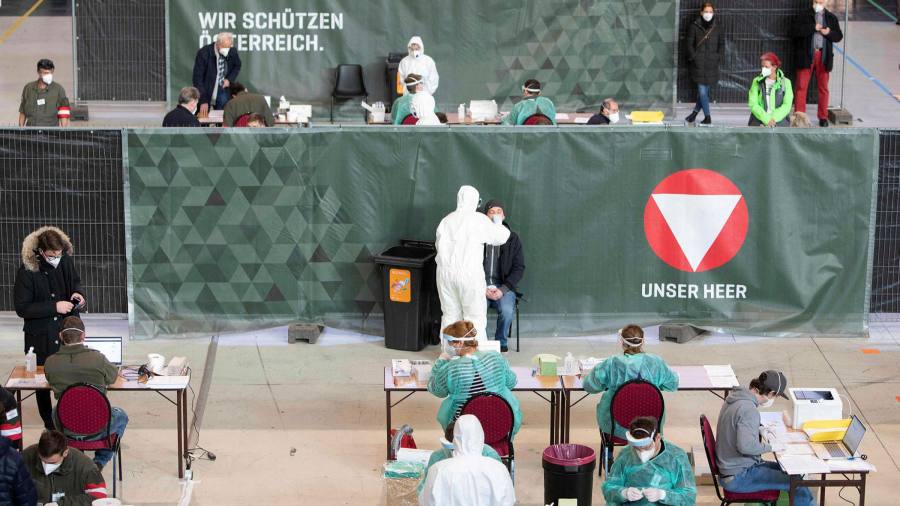[ad_1]
As lockdowns across Europe drag on into spring, the Austrian government says it has a strategy to get life back to normal in weeks rather than months — not with vaccines, but tests.
The country of 8.8m people will from Monday make 3.5m Covid tests available free to its citizens each week. The plan could allow restaurants and bars to start welcoming customers back by mid-March. Non-essential shops and schools are already open and many Austrians have returned to their workplaces.
“We are on the way to becoming the testing world champion,†said chancellor Sebastian Kurz. “Our goal is to be able to control the incidence of infection, or at least mitigate any growth in infection numbers, as best we can, by testing as much as possible.â€
As Covid cases climb, Austria has grown frustrated with the EU’s slow vaccine rollout. The bloc’s performance particularly rankles because last May — in deference to EU solidarity — Kurz turned down a tentative offer from Benjamin Netanyahu to partner with Israel in its vaccination drive with Pfizer, two Austrian officials told the Financial Times.
Kurz has a close working relationship with the Israeli leader and the two regularly discuss the pandemic.
The missed opportunity for the kind of swift vaccination programme pioneered by Israel underscored the importance for smaller countries such as Austria to be flexible in their approach to the virus, a political adviser close to the chancellor said.Â
Austria’s faith in testing has put it at odds with other European countries where the Covid policy is almost solely focused on immunisation as a means of escaping another wave of the pandemic.
That has left much of the continent languishing under stricter lockdown conditions than those enforced when the pandemic first hit a year ago.
Britain is Europe’s vaccine leader, with more than 28 doses of vaccine delivered per 100 residents. Austria has managed just 6 — slightly less than the 6.3 EU average. But last week the UK government said it still expected to impose four more months of restrictions to control the virus.
For critics, Vienna is walking a tightrope: cases in Austria have ticked up from the low of 14.9 per 100,000 residents a fortnight ago to a rolling seven-day average of 19.2. The next two weeks will be crucial: if numbers continue to rise Austria’s strategy will unravel.
But the focus on testing will also be closely watched. Chancellor Angela Merkel told lawmakers in her party last week she believed mass testing would be a critical in helping Germany ease its way back to normality.
Thomas Czypionka, head of health policy at the Institute of Higher Studies in Vienna, said “a tight net of testing†would provide the opportunity to reopen businesses and schools by controlling transmission of the virus. “This is a different kind of strategy. It’s not perfect, but its worth a try.â€
The Austrian initiative should in part be understood in the context of the government’s poor handling of the second wave, according to Czypionka.
Feted for his nimble handling of the crisis last spring, Kurz has since faced criticism as the number of cases soars. In November, Austria recorded the highest number of new infections per million inhabitants in western Europe.
Testing is crucial, according to Czypionka, because people’s willingness to tolerate restrictions and their disastrous economic consequences had reached its limit. “People have lost faith. This is the real reason the government is having to open up.â€
He was nevertheless confident that the testing strategy was a good one: “It’s cheaper than keeping a country in lockdown.â€
While Austria’s first experiment with mass-testing began in December, with limited success, the latest drive is markedly different. Testing will be linked to the phased emergence from lockdown itself — using reliable PCR tests for entry into venues, and quick result lateral flow tests for home use. Officials at the chancellery said they believed this “nudge†approach — where even small incentives can prove powerful motivators for social change — has been highly successful.
Hair salons have been open in Austria since February 8. But their use is conditional on testing: customers must present proof of a negative test no later than 48 hours before an appointment.
The idea is now being thrashed out for the hospitality sector. An announcement is expected to be made this week, but the government is hopeful that entry tests at restaurants, bars and cafés could allow for a reopening of some — with strict hygiene measures also in place — as early as March 14.
“My heart bleeds because tens of thousands of businesses have not been allowed to open for months. We will do everything we can to ensure that the catering and hotel industry can welcome guests again soon. I’m on the side of the industry,†tourism minister Elisabeth Köstinger said last week.
Capacity for tests has been increased dramatically. There are now 800 pharmacies across Austria offering tests, and a further 650 specialist testing stations. From Monday, the government hopes to make up to five postal tests — which can be ordered by telephone hotline or online — available to every Austrian each week.
Schools are testing pupils twice a week and workplaces have been brought onboard. The government is subsidising more than 1,000 Austrian companies — representing a workforce of just under 500,000 — to provide them with free regular tests for those who want to return to the workplace.
Testing was the best way to avoid an “indefinite lockdownâ€, Kurz declared last week, as he promised Austrians the government would do whatever it could to safely reopen public life.
[ad_2]
Source link







